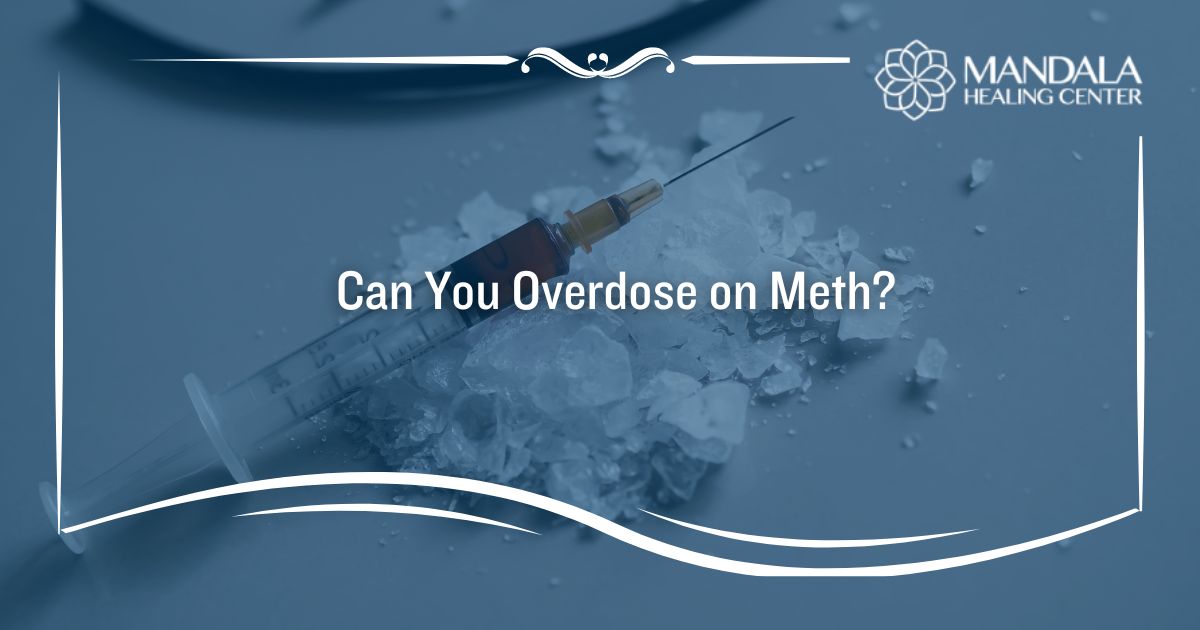Meth is a potent stimulant drug that is used medicinally to treat attention-deficit hyperactivity disorder (ADHD). If you get it from a doctor, it might be called Desoxyn.[1] The meth you buy off of the street is different, as it is made illegally and contains dangerous chemicals.
Most people who abuse meth are buying it from drug dealers. According to the National Institute on Drug Abuse (NIDA), 2.5 million people in the United States abused meth in 2021.[2]
Repetitive use of meth will lead to an addiction. Once you become addicted to meth, you will develop a tolerance, which means you’ll have to use larger doses to get high. This puts you at risk of experiencing a meth overdose.
The symptoms of a methamphetamine overdose might include increased or irregular heart rate, chest pains, high blood pressure, and even heart attacks. In other words, meth overdoses are life-threatening. You should seek help from an addiction treatment program to prevent yourself from experiencing one.
In this article, you will learn:
- How people abuse meth
- What are the effects of meth
- How much meth does it take to experience an overdose
- What are the symptoms of a meth overdose
How Do People Abuse Meth?
Meth is a crystalline substance that sometimes resembles rock candy. The most common way to abuse meth is by smoking it. Individuals heat the crystals into a pipe before inhaling the vapors.
It is possible to snort, swallow, or inject meth. To snort meth, one simply crushes up the crystals into a powder, but since the crystals are sharp, nosebleeds are common among those who snort the drug.
Some people simply swallow the crystals or place them into pills to “parachute” them. It takes longer for the effects to begin this way.
Lastly, it is possible to inject meth. People heat the crystals until they become a liquid that can be drawn into a syringe. Meth is injected intravenously.
While any type of meth abuse is dangerous, injecting it leads to the most potent effects. It is important to note that no matter how you are abusing meth, taking too much at once will lead to an overdose.
What are the Effects of Meth?
Meth is a stimulant and an amphetamine. It speeds up the processes that occur within your brain. You might experience increased energy, racing thoughts, intense emotions, and a heightened ability to focus.
Other common effects of meth include:[3]
- Increased heart rate and arrhythmias
- Heightened body temperature and excessive sweating
- Dilated pupils
- Decreased appetite and weight loss
- Lessened need for sleep
- A rush of euphoria or feelings of pleasure
- Anxiety or paranoia
- Aggressive or erratic behavior
- Substance-induced psychosis
Meth abuse can cause long-term mental health issues, especially if you have a condition like bipolar disorder or schizophrenia. The way the drug affects your brain makes you more likely to experience a psychotic episode.[4] As a result, you should avoid meth abuse when you have an underlying mental illness.
How Much Meth Does it Take to Overdose?
The amount of meth it takes to overdose varies depending on certain factors. For example, your body weight, tolerance, and whether you have consumed other drugs can play a role.
Some of the variables that play a role in how much meth it takes to overdose include:
- Your age and body mass index (BMI)
- The speed of your metabolism
- The method of administration (i.e. smoking, snorting, swallowing, injecting)
- Your overall health and the presence of pre-existing health conditions
- Whether you have consumed other drugs
- Your body’s tolerance for meth
While one person might be able to consume large doses of meth without life-threatening symptoms, you could take that same dose and experience a heart attack or stroke. Thankfully, drug rehab programs can offer the tools and support you need to achieve sobriety before it’s too late.
Signs of a Meth Overdose
Meth overdoses are life-threatening and require immediate medical attention.
The common symptoms of a meth overdose include:[5]
- Agitation and paranoia
- Rapid or irregular heartbeat
- Stomach pains
- Trouble breathing
- Elevated blood pressure
- Extremely high body temperature
- Heart attack, stroke, and seizure
- Coma and death
If you believe someone you love is experiencing a meth overdose, contact 911 immediately. They will be treated and referred to an addiction treatment specialist once they overcome their symptoms.
Find Help for Meth Addiction
If you or a loved one suffers from meth addiction, it’s time to seek professional help. At the Mandala Healing Center, we believe in offering individualized and evidence-based treatment. In other words, our program gives you the best shot at long-term recovery possible.
Contact us today for more information on how to get started at our highly-rated meth addiction treatment center.
References:
- The Food and Drug Administration (FDA): Desoxyn Label
- The National Institute on Drug Abuse (NIDA): What is the scope of methamphetamine use in the United States
- The Substance Abuse and Mental Health Services Administration (SAMHSA): Know the Risks of Meth
- Science Direct: Methamphetamine-Induced Psychosis
- Medscape: Methamphetamine Toxicity












